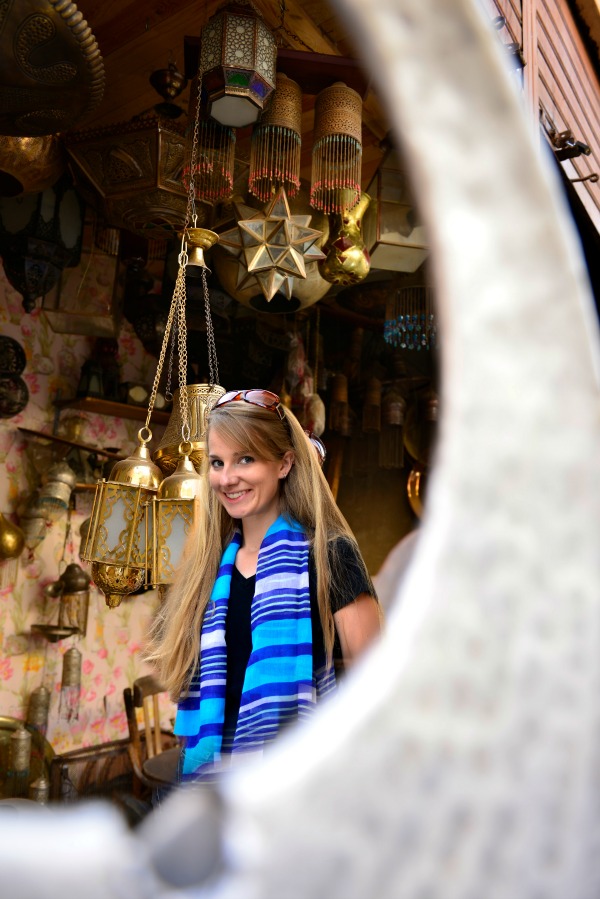Students at nearly any institution in the world can choose to study abroad for a semester. But what happened after she got back from a semester in the Middle East, said graduate Julianna Smith, is what made her Malone experience so meaningful.

"These experiences - rocking orphan babies, visiting African prisoners in Egyptian jails, walking around the grand mosques of Turkey, hiking in the Golan Heights, and breaking the Ramadan fast in the home of a poor Muslim family on the outskirts of Cairo - would have become distant memories from 'that crazy semester abroad' when I visited all sorts of 'neat sites' had it not been for the faculty at Malone," says Julianna, who was an honors student.
"Malone's History, Philosophy, and Social Sciences department, along with their colleagues in Theology, Communication Arts, and English, helped me through my post-cross-cultural-engagement phase. They encouraged me to reflect on my experiences, raise new questions and fill in the blanks that were left after I returned to campus. Ultimately, that encouragement to ask new questions and continue to respond to that semester abroad led me to move back to Egypt and work for a year after graduation, return again to the US to do a master’s degree in Near Eastern Languages and Cultures [at The Ohio State University], write a thesis on Coptic Church state relations in modern Egypt and return once more to Egypt to work at a private hospital.”
Julianna had gone to Egypt through the Council for Christian Colleges & Universities (CCCU) Middle East Studies Program, which particularly encourages students to contemplate their Christian faith in their new environment.
During her experience, Julianna says, “The way I processed family relationships, friendships, politics and faith was now being run through this filter of the Middle East. For those who have never experienced having their deepest held assumptions challenged by engaging people different than themselves who are part of a system different than their own, it is difficult to explain. Engagement is transformational.”
But, she says, she had gone through a spiritual transformation at Malone even before studying abroad for a semester.
“I learned that it is okay to ask questions about my faith,” Julianna says. “The Church has endured for more than 2,000 years. It has yet to crumble under the weight of challenging questions posed by some of the greatest minds on the earth and it certainly won’t crumble under my questions. When I realized that I could play the part of the skeptic and that I didn’t have to write the fool-proof defense for things I did not really understand, I really started to grow. Allowed to question and encouraged to seek answers under the guidance of gifted faculty members, I found that my understanding and faith, in the end, grew exponentially.”
Julianna also learned how her faith connected to all of the other parts of her life.
"Seriously, I throw away my garbage differently now because I was taught how to think about creation care,” Julianna says. “How do I spend my weekends? What food do I eat? Where and how do I vacation? What transportation choices do I make? These questions all were made relevant in light of my faith by my Malone education in addition to critically thinking about the integration of my faith in my area of academic specialty.”
As she grew in her spiritual development, she began thinking through what it meant to be a part of Christ’s Kingdom.
“Throughout my four years at Malone this idea of the ‘Kingdom of God’ was emphasized in the classroom, dorms and chapel. My worldview, in many ways (and not yet as many as I would like) was shaped through the emphases of this theme,” she says. “My thoughts started to go through filters such as: how do I understand this as a ‘Kingdom person’? How do I understand this in light of the present but not yet fully realized Kingdom of God? How would my perspective change if I really believed ‘thy Kingdom come, thy will be done’ in this situation? Really, my time at Malone was just the beginning of transforming my worldview into a ‘Kingdom worldview.’”
If one is to ask Julianna what she “does,” she’ll tell you about her job in Egypt working for a private hospital – on their business development project, which means that she is researching the health care industry, finding its gaps, and advising her hospital on how to best fill those gaps.
Then she will say, “But, Malone taught me the concept of vocation—what I do goes beyond the five-day-a-week nine-to-five career. So what else do I do? I live in Cairo. I work at my job. I am part of a local church, I go out with friends, I regularly purchase groceries from my favorite local vendors. I am part of my community.”
And then, she’ll invite you – any member of the Malone family – to dinner if you are ever in Cairo.
Her treat.
